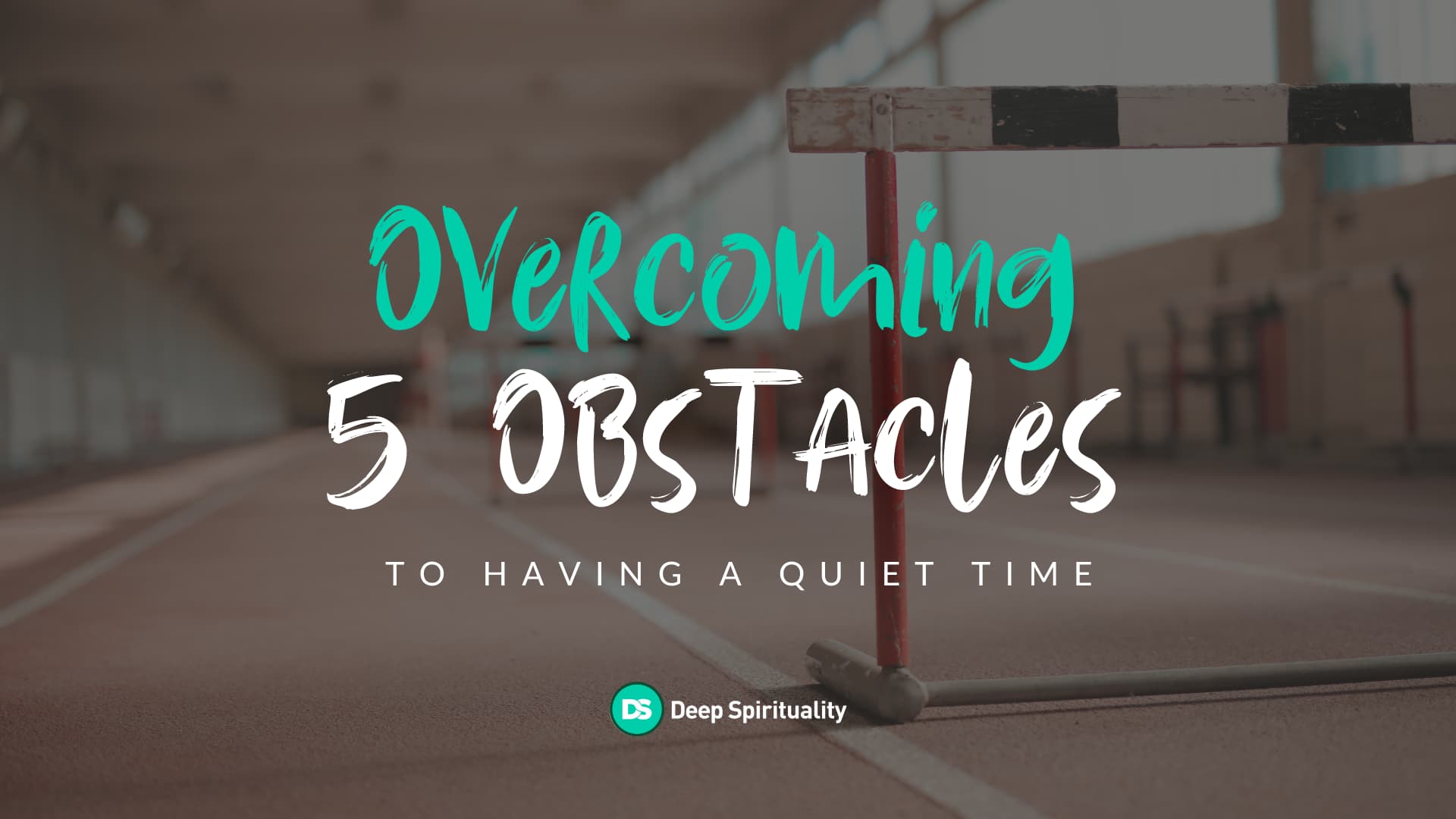Table of Contents
- Be inspired by friendship (Abraham)
- Be moved by attachment (Moses)
- Be driven by desperation (Hannah)
- Be fueled by gratitude (David)
- Be vulnerable through awareness (King Solomon)
- Hear God’s voice (Elijah)
- Believe in your destiny (Esther)
- Defeat sin through prayer (Nehemiah)
- Eliminate distractions (Jesus)
- Deeply attach by understanding (Paul)
- Need help getting started? Take the prayer quiz
Growing up, a favorite show of mine was “Happy Days.”
I admired one of the key characters, “Arthur Fonzarelli” (also known as the “Fonz”) because he was always cool, self-assured, popular, and seemingly able to handle any problem.
Yet his greatest difficulty was his inability to admit when he was wrong, be vulnerable, and voice his needs with friends.
What the Fonz portrayed on TV is what we can struggle with in our relationship with God—the resistance to admit the truth of how and when we’ve been wrong or what we need. This leads to a difficulty to connect in relationships, especially when it comes to our relationship with God.
When we resist this kind of vulnerability and specificity when talking to God, we struggle to know how to pray and hit a wall spiritually. Just as distance runners hit a wall—the point where they experience sudden fatigue and loss of energy when glycogen runs out—we can also hit a wall in our prayer life.
In those moments, when we lose our desire, energy, passion, and inspiration to pray, we need help from the Bible to learn how to pray to God and make an intimate connection with him.
Jesus’ disciples reached a point where they realized that they had hit a wall in prayer and so they asked Jesus to help them:
One day Jesus was praying in a certain place. When he finished, one of his disciples said to him, “Lord, teach us to pray, just as John taught his disciples.”
Luke 11:1 NIV
We can get the best tips to learn how to connect with God from people in the Bible. They were imperfect people who struggled and had victories and defeats. Yet through it all, they were honest and authentic in their prayers.
Whether you’re a beginner learning to pray or a veteran, we could all benefit from taking time to learn (or relearn) from the powerful men and women of faith in the Bible. The following are 10 tips for how we can develop a powerful connection with God through prayer:
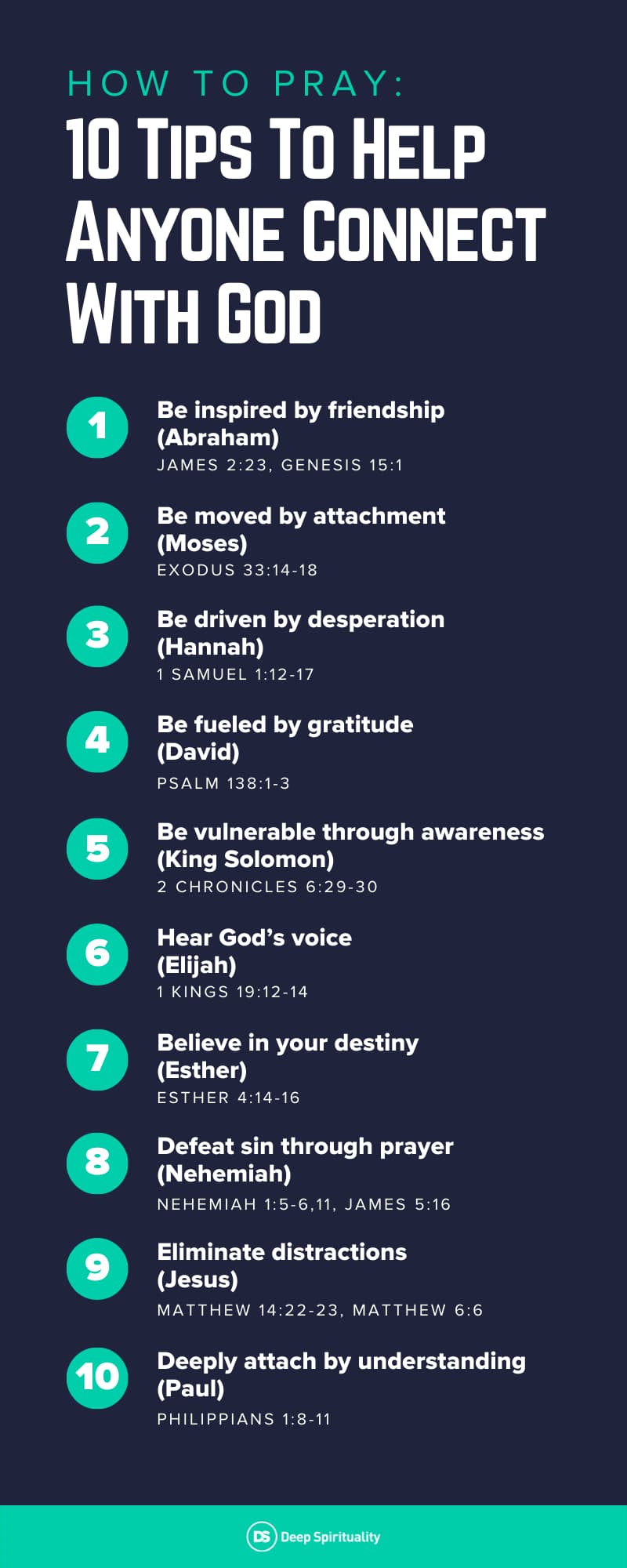
Be inspired by friendship (Abraham)
And the scripture was fulfilled that says, “Abraham believed God, and it was credited to him as righteousness,” and he was called God’s friend.
James 2:23 NIV
After this, the word of the LORD came to Abram in a vision: “Do not be afraid, Abram. I am your shield, your very great reward. ”
Genesis 15:1 NIV
My lifelong quest is to become like Abraham and be called, “God’s friend.” When prayer becomes a habitual duty or just something we are supposed to do, then we are missing the most essential ingredient: friendship.
Friendships are built with connections and moments both big and small. These connections accrue over time and develop intimacy, depth, and attachment. The reward of prayer according to Genesis 15 is not that God does everything we ask, but we get to be close to him.
Good prayers don’t follow a script or have a particular methodology; they are simply the times that develop our friendship with God.

Are you taking time to share the little moments of gratitude, your deepest feelings, and your greatest dreams with God to build your friendship?
Be moved by attachment (Moses)
The LORD replied, “I will personally go with you, Moses, and I will give you rest—everything will be fine for you.” [15] Then Moses said, “If you don’t personally go with us, don’t make us leave this place.
[16] How will anyone know that you look favorably on me—on me and on your people—if you don’t go with us? For your presence among us sets your people and me apart from all other people on the earth.” [17] The LORD replied to Moses, “I will indeed do what you have asked, for I look favorably on you, and I know you by name.” [18] Moses responded, “Then show me your glorious presence.” Exodus 33:14-18 NLT
Moses did not want to go anywhere without God.
God’s presence is what Moses wanted and needed the most. Too often, I will pray in the morning but then go through my day and not think about or connect with God along my way.

God does not want us to simply check in with him in the morning but wants us to continually think about him and communicate with him all day.
Those times throughout the day when we think about God, talk to him, thank him, or ask him for help all show and develop our attachment to God. Prayer is made personal and meaningful when it continues past our morning quiet time.
Be driven by desperation (Hannah)
As she kept on praying to the LORD, Eli observed her mouth. [13] Hannah was praying in her heart, and her lips were moving but her voice was not heard. Eli thought she was drunk [14] and said to her, “How long are you going to stay drunk? Put away your wine.”
[15] “Not so, my lord,” Hannah replied, “I am a woman who is deeply troubled. I have not been drinking wine or beer; I was pouring out my soul to the LORD. [16] Do not take your servant for a wicked woman; I have been praying here out of my great anguish and grief.” [17] Eli answered, “Go in peace, and may the God of Israel grant you what you have asked of him.” 1 Samuel 1:12-17 NIV
We all experience times of anguish and grief like Hannah, and in those moments we can choose to pour out our soul to God.
When Hannah felt desperate, she prayed. She knew only God could assure her and fulfill her vision to raise a child to love him. Because she prayed, she was able to go in peace, confident God had heard her request.

In contrast, I often harden my heart and resist pouring out my soul to God because I don’t like feeling my need nor sharing my emotions. But prayers are made much more potent when we express everything when we communicate with God.
Be fueled by gratitude (David)
I thank you, Lord, and with all the passion of my heart I worship you in the presence of angels! Heaven’s mighty ones will hear my voice as I sing my loving praise to you.
2 I bow down before your divine presence and bring you my deepest worship as I experience your tender love and your living truth. For the promises of your word and the fame of your name have been magnified above all else!
3 At the very moment I called out to you, you answered me! You strengthened me deep within my soul and breathed fresh courage into me.
Psalm 138:1-3 TPT
There are times when I feel as though I’ve lost passion for God, and I’ve quit praying for specific things, or quit praying altogether.
In these moments, I learn how to pray from King David in how he kept his passion for God burning — in the face of setbacks, struggles or stressors in his life — by focusing himself on being grateful for God.
Gratitude is what jump-starts our prayer life, renews our faith, and inspires others about God’s possibilities rather than our human impossibilities. In fact, I’ve found that my lack of passion and spiritual strength is usually preceded by a loss of gratitude and a prideful sense of entitlement.
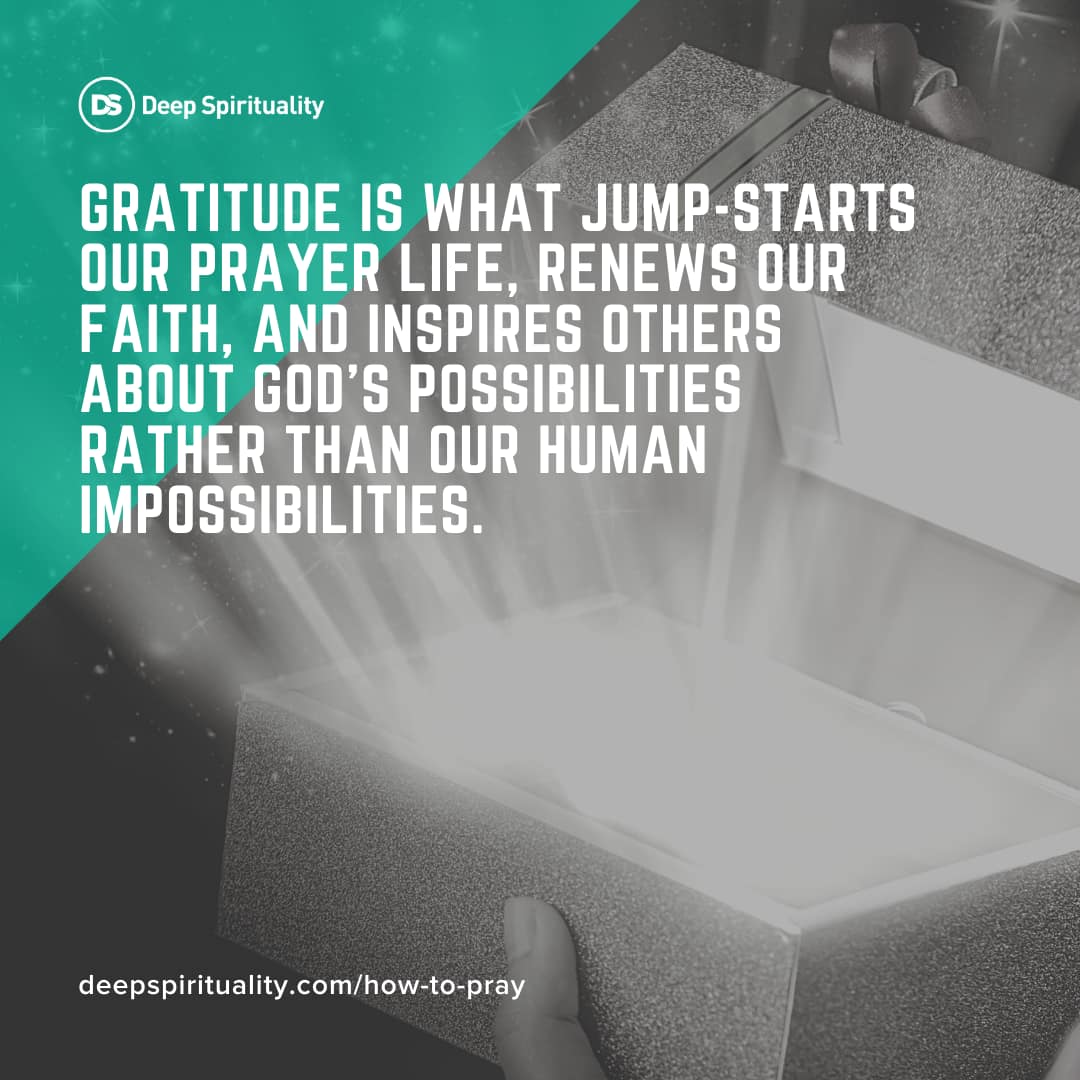
We must evaluate our prayer life, not just by the length of time we spend, but by how much more gratitude for God and love for others we walk away with.
It’s when we learn how to pray to God with gratitude that he empowers us with spiritual strength and compels us to put our love for God and for others into action.
Be vulnerable through awareness (King Solomon)
… And when a prayer or plea is made by anyone among your people Israel—being aware of their afflictions and pains, and spreading out their hands toward this temple— then hear from heaven, your dwelling place. Forgive, and deal with everyone according to all they do, since you know their hearts (for you alone know the human heart)
2 Chronicles 6:29-30 NIV
When we’re too busy, tired, stressed, or unmotivated to pray, it’s because we’ve become hardened from living in denial of what’s going on inside our hearts and lives. The struggle to pray reflects our resistance to be spiritually influenced.
It is through the scriptures and honest conversations with friends that God helps us develop awareness about our true motives, emotions, thoughts, sins, and desires of our hearts. (Hebrews 4:12-13, Proverbs 20:5)
We can’t be vulnerable with what we are unaware of. Awareness and vulnerability in prayer is key to connecting with God emotionally, and this was a truth Solomon deeply understood and prayed about for the nation he led to understand.

Rather than isolate, we must pursue and welcome the daily influence of spiritual relationships and the Scriptures, to develop heart awareness that will make our prayers vulnerable and real, rather than superficially religious.
It’s when we have these emotionally honest prayers with God that God can reach even the deepest parts of our hearts and bring about the answers our souls long for.
Hear God’s voice (Elijah)
And after the earthquake there was a fire, but the LORD was not in the fire. And after the fire there was the sound of a gentle whisper.
[13] When Elijah heard it, he wrapped his face in his cloak and went out and stood at the entrance of the cave. And a voice said, “What are you doing here, Elijah?” [14] He replied again, “I have zealously served the LORD God Almighty. But the people of Israel have broken their covenant with you, torn down your altars, and killed every one of your prophets. I am the only one left, and now they are trying to kill me, too.” 1 Kings 19:12-14 NLT
Elijah had exhausted himself fighting for God and his people. He was burnt out and discouraged. God knew Elijah needed encouragement, direction, and vision.
But, Elijah had to be in a place emotionally where he could hear God’s voice of encouragement. God’s voice came to Elijah as a gentle whisper.

When we are overscheduled, overworked, and feeling overwhelmed, we are not able to hear God’s voice. Like Elijah, we must slow down and listen for the gentle whisper of encouragement coming from God.
Are you taking time to extricate yourself from the busy-ness of life and calming the noise in your heart and head so you can hear God’s voice? Are you taking time in the Scriptures to understand what you are reading and letting it penetrate to your heart?
Believe in your destiny (Esther)
If you keep quiet at a time like this, help will come from heaven to the Jews, and they will be saved, but you will die and your father’s family will come to an end. Yet who knows—maybe it was for a time like this that you were made queen!”
[15] Esther sent Mordecai this reply: [16] “Go and get all the Jews in Susa together; hold a fast and pray for me. Don’t eat or drink anything for three days and nights.My servant women and I will be doing the same. After that, I will go to the king, even though it is against the law. If I must die for doing it, I will die.”
Esther 4:14-16 GNT
Prayers are electrified when we have a deep belief that our lives are a part of God’s bigger plan. Esther could see through Mordecai’s encouragement that her position in life did not happen by mere chance. God had placed her there because it was her destiny to be used to change the world.
The Scriptures say God has placed every one of us exactly where he wants us to be used by him. (Acts 17:26) That means that we can live our lives with excited anticipation looking for opportunities and possibilities for God to move. This kind of faith is what transforms our prayers from rote and methodical to dynamic.

Defeat sin through prayer (Nehemiah)
5 Then I said: “Lord, the God of heaven, the great and awesome God, who keeps his covenant of love with those who love him and keep his commandments,
6 let your ear be attentive and your eyes open to hear the prayer your servant is praying before you day and night for your servants, the people of Israel. I confess the sins we Israelites, including myself and my father’s family, have committed against you.
11 Lord, let your ear be attentive to the prayer of this your servant and to the prayer of your servants who delight in revering your name. Give your servant success today by granting him favor in the presence of this man.”
Nehemiah 1:5-6,11 NIV
16 Confess your sins to each other and pray for each other so that you may be healed. The earnest prayer of a righteous person has great power and produces wonderful results.
James 5:16 (NLT)
One of the greatest comeback stories in the Bible was led by Nehemiah. His prayer life was the catalyst for the rebuilding of an entire city and renewal of hope for the people of God previously exiled. His specific confession of sin is what made his prayers both effective and powerful!
To confess means “to agree with” God about our sin—how he views, thinks, and feels about the impact of our sin on our relationship with him and others (2 Corinthians 7:10-11).
When our primary aim is to deny or minimize our sins (Psalm 66:19-20), prayer becomes a powerless religious exercise in ineffectiveness, rather than an energizing turning point that leads to spiritual impact and change.
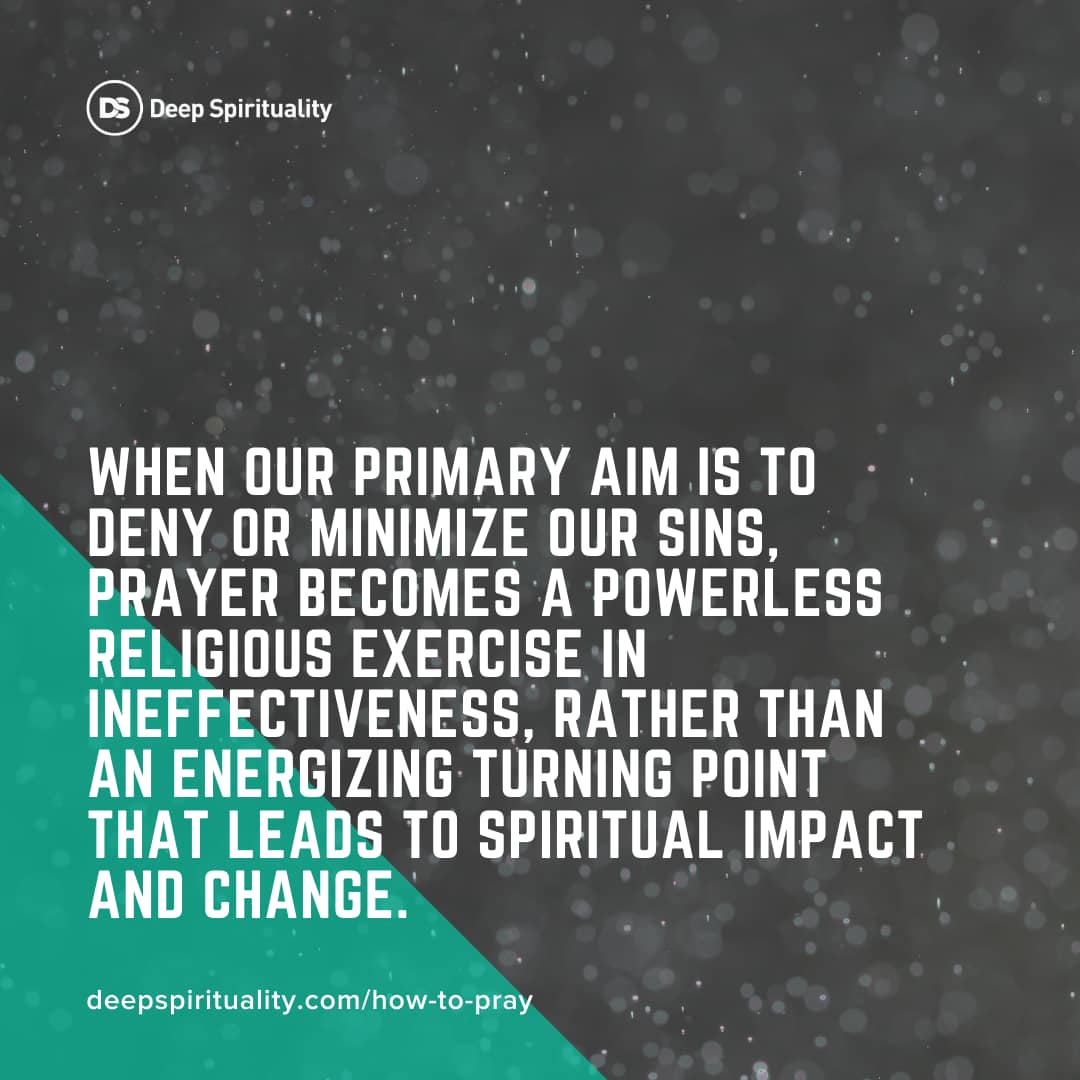
By studying Nehemiah’s life, we can learn and be inspired by how he overcame the debilitating and defeating power of sin through prayer. He was successfully used by God to not only rebuild the walls of Jerusalem but to revive the people’s hopes and hearts for God.
Eliminate distractions (Jesus)
22 Immediately afterward He compelled the disciples to get into the boat and to go ahead of Him to the other side, while He sent the crowds away. 23 After He had sent the crowds away, He went up on the mountain by Himself to pray; and when it was evening, He was there alone.
Matthew 14:22-23 NASB2020
But when you pray, go into your room, close the door and pray to your Father, who is unseen. Then your Father, who sees what is done in secret, will reward you.
Matthew 6:6 NIV
No meaningful conversation of depth (especially prayer) can be had in a place filled with distractions. This is why Jesus deliberately sent away the crowds, prioritizing setting aside uninterrupted and spiritually rejuvenating times with God.
Similarly, despite whatever demands or busyness preoccupy our days, we must imitate how Jesus prioritized personal and undistracted moments and places, just to be alone and connected with God in prayer.
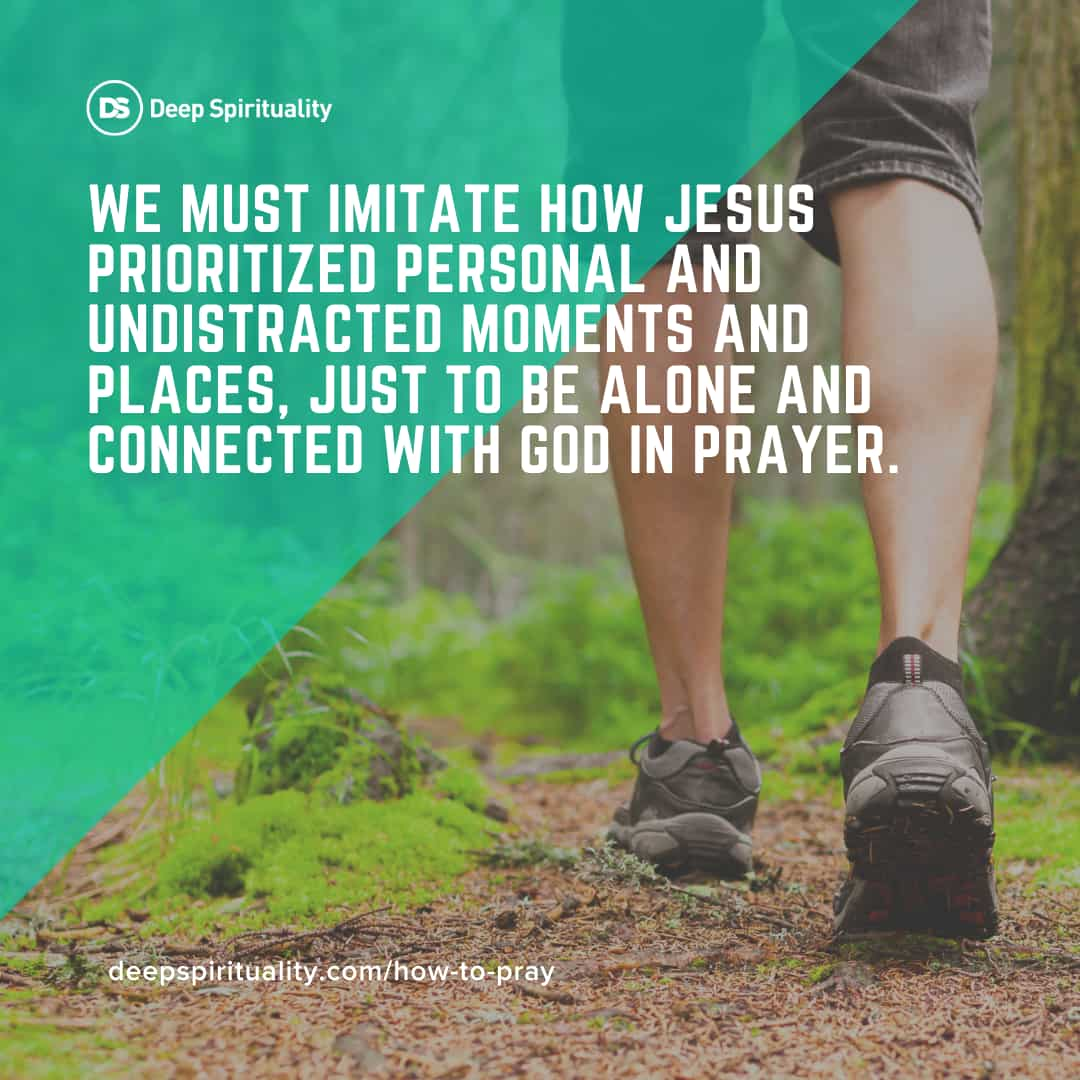
Find a specific place where your only focus is God, which means closing the door to any distractions, whether from your phone, home, school, workplace, or social media. God wants to hear from you, not your texts, emails, or the stressors around you. Set out inspiring places and times where he’ll have your undivided attention and spiritual focus.
Deeply attach by understanding (Paul)
8 God knows how much I love you and long for you with the tender compassion of Christ Jesus. 9 I pray that your love will overflow more and more and that you will keep on growing in knowledge and understanding.
10 For I want you to understand what really matters, so that you may live pure and blameless lives until the day of Christ’s return.
11 May you always be filled with the fruit of your salvation—the righteous character produced in your life by Jesus Christ—for this will bring much glory and praise to God.
Philippians 1:8-11 (NLT)
When my prayer life is stale and uninspired, it stems from a disinterest in understanding the lives and needs of others. Without a genuine interest in understanding others, we can’t genuinely nor deeply love.
Inspired prayers are fueled by love. Love invigorates us to overcome the walls we hit. When we expect God to attend to and understand our every need and struggle, but lack this same understanding and concern for others (e.g. husbands for wives), then how can we expect God to be moved?
Specificity in prayer reflects our depth of care and depth of understanding for people. We develop an attachment and understanding for others through prayer — praying for their specific needs, praying about the vision God has for others, praying for wisdom (James 1:5) to discover how we can help them become who God destined them to be.
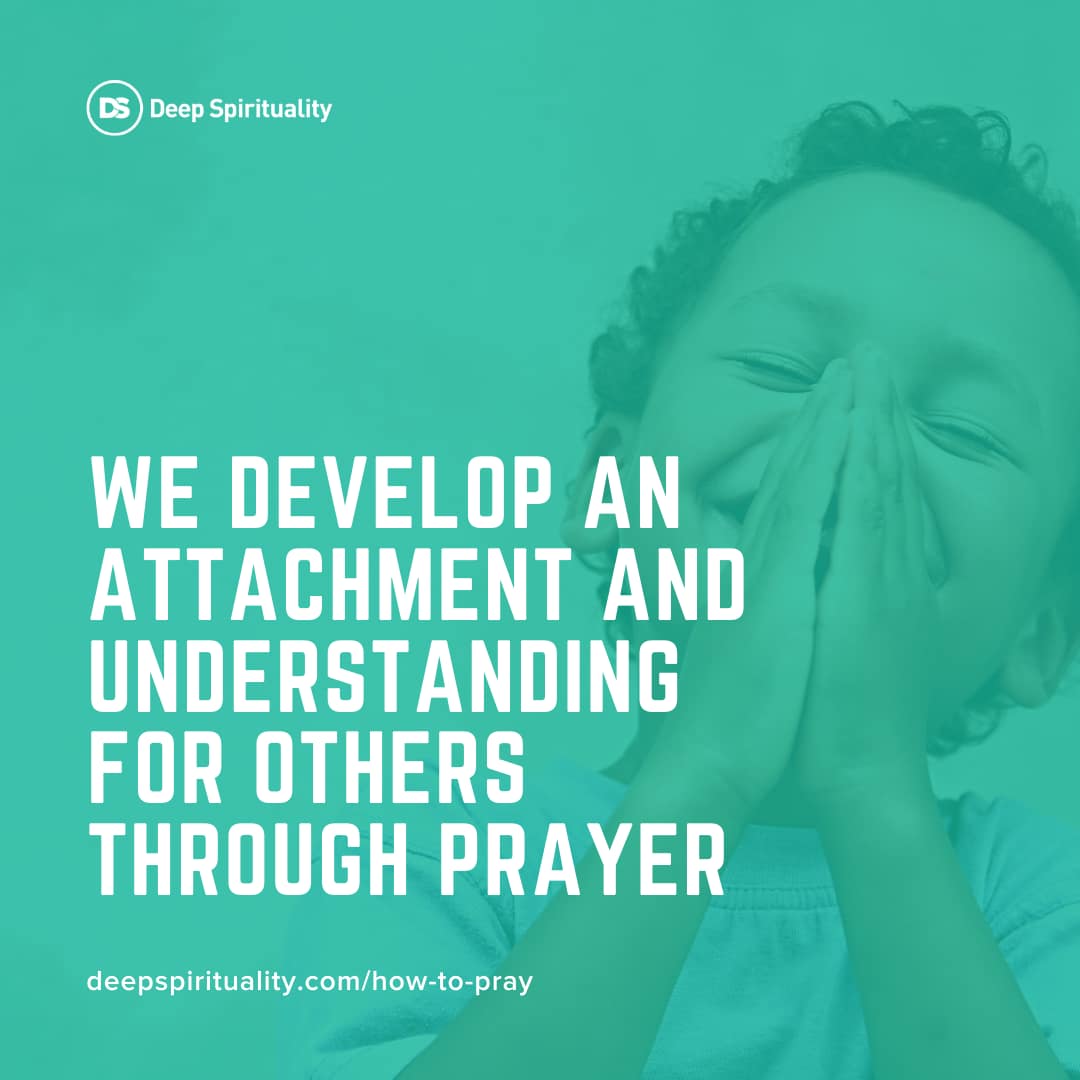
God reveals to us original thoughts and ways to inspire, involve, and influence others when our prayers are fueled by selfless love and deep determination to help them grow spiritually. It’s in this way we grow deeply attached to others.
Ultimately, prayer is what will get us through all of our difficulties and help us come out on the other side closer to, more connected with, and having a deeper belief in God. After all, what is prayer if not the method by which we grow closer to him while unburdening ourselves?
Take these 10 tips and do your own Bible study of prayerful people in the Bible and we can transform the world around us through our prayers to God.
Need help getting started? Take the prayer quiz
Not sure which of the prayers mentioned in this study you need the most now? Take our quiz to find out. This is a fun and reflective way to understand our hearts and what we may need. You may not agree completely with your results, as they likely won’t perfectly describe you.
But that’s okay – just have fun reflecting on the process and getting closer to God through prayer.
Explore more:
Scott Colvin works in ministry and community service in the San Francisco Bay Area. Scott ran cross country for the University of North Carolina. Some say he's still running to this day.
Scott Colvin works in ministry and community service in the San Francisco Bay Area. Scott ran cross country for the University of North Carolina. Some say he's still running to this day.





